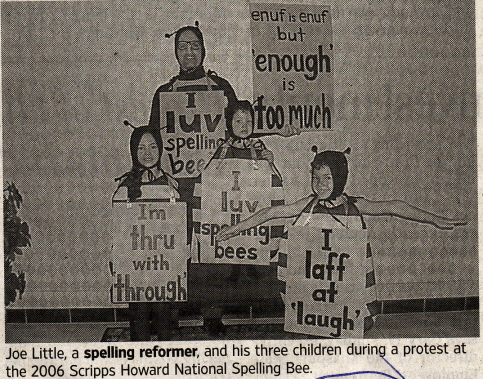May 30, 2008, - 3:17 pm
Waaay Too Much Time on Their Hands: Spelling Bee Truthers Hold Protest
By Debbie Schlussel
Of all the things you could protest in America, this wouldn’t even be number gazillion on my list . . . or that of most Americans.
But, tonight, while ABC airs the final two hours of the National Spelling Bee live in prime-time, “Spelling Reformers” will be protesting our spelling, outside the Washington, DC National Spelling Bee venue. I call them “Spelling Truthers.” They don’t like that we spell things according to romance language root word and origin. They want us to spell phonetically.
Oddly enough, one of the Spelling Truthers is the mother of supermodel/actress Rebecca Romijn, Elizabeth Kuizenga (no “spelling reform” in either of their surnames). She supports Spelling Trutherism for the silly reason that she was laughed at when she mispronounced something as a kid.

The spelling reformers are trying to capitalize on the moment. Every year, a group travels to the Bee site, the Grand Hyatt in Washington, to hold a protest on the sidewalk outside. They hand out pamphlets and pins that say “I’m Thru with Through.” Some dress as bumblebees. Last year, the protesters spent much of the $1,500 budget allotted to them by the American Literacy Council, to hire a Benjamin Franklin impersonator to articulate for children, television cameras and other passersby the Founding Father’s advocacy of spelling reform. They stress that they are protesting the words themselves, not the children who are competing.
The Bee protest was the brainchild of Alan Mole, president of the ALC and a rocket scientist — an aerospace stress analyst — in Colorado. It is organized every year by Elizabeth Kuizenga, a California teacher of English-as-a-second-language and the mother of the actress Rebecca Romijn (pronounced romaine). Ms. Kuizenga says she became interested in spelling reform as a child, when she mispronounced the word “ignorance” and her parents laughed at her.
Although some great Americans, like Mark Twain, Teddy Roosevelt, advocated “Spelling Trutherism,” I think it’s a terrible idea. When I read a new word with which I’m not familiar, I can usually figure it out or have some idea what it means because the root words are spelled correctly. With “Spelling Reform,” it will be next to impossible to dissect and deduct the meanings of words that way. And it will also affect grammar in a negative way.
Aside from that, we already have “Spelling Reform.” It’s called Publick Skool Edyookayshun.
And how would Spelling Reform work in places with different accents? It simply wouldn’t be compatible, with different spellings from Bostonians who pass through “Hah-vuhd Yahd” and those from, say, California, who drive a “Kahr.”
The whole idea is absurd and just an excuse for the further dumbing down of America. Of all the problems facing America right now, this ain’t one of ’em.
We can’t get many Americans to even learn to speak, read, or write English at all, let alone learn how to spell correctly . . . or in the phonetic “spelling reform” manner.
Perhaps, they should start a “Spelling Reform” protest of our (likely) new national language: Spanish (or Arabic).


This is just another attempt to dumb down America. Don’t worry future generations, you don’t have to learn how to spell or be literate, just be lazy. Thats the whole excuse for the Negro-ebonics- bullsh*t they have now. Soon they will just grunt, most of them do anyway so its not that great a leap in our near future.
No offense to Debbie’s African-American readers, if you’re reading Debbie’s site then you already know how to spell and speak english.
wolf2012 on May 30, 2008 at 4:03 pm